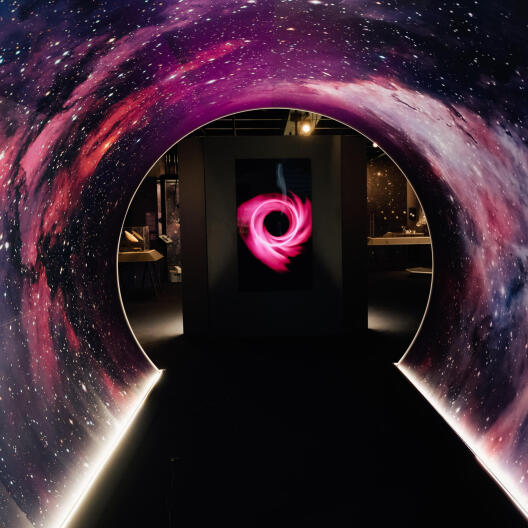"Religious ideas about the cosmos”
Cluster of Excellence involved in “Our Universe” exhibition of the MS Wissenschaft

The Cluster of Excellence “Religion and Politics” is contributing its ideas about religion and the cosmos in the “Our Universe” exhibition of the MS Wissenschaft. Its researchers will explain in short lectures held on the Federal Ministry of Education and Research exhibition boat the ideas of cosmos and space that the world religions have developed in different epochs – from Judaism to Buddhism to Islam.
This year, the “MS Wissenschaft” will anchor in Münster’s city harbour at the Kunsthalle from 8 to 11 July, with Cluster of Excellence members speaking on 10 and 11 July in the “Meet the Scientist” programme. Participants are invited to the programme by the University of Münster’s Innovation Office (Arbeitsstelle Forschungstransfer (AFO)). The interactive exhibition on board the MS Wissenschaft is open from 8 to 11 July from 10 am to 7 pm. Admission is free.
The Judaist and medievalist Prof. Dr. Katrin Kogman-Appel will describe in her lecture (10 July, 4-5 pm) medieval ideas of the cosmos, and explain what medieval scholars already knew about the cosmos. The Islamic theologian Prof. Dr. Mouhanad Khorchide will speak on 10 July (5-6 pm) about Islamic perspectives on the creation of the universe, and will also explore the motif of resurrection after death as well as different interpretations of heaven.
The theologian and religious scholar Prof. Dr. Perry Schmidt-Leukel will shed light in his lecture (11 July, 5.30-6.30 pm) on Buddhist cosmology and the Buddhist belief in reincarnation based on the traditional representation of the “Wheel of Birth” (bhavacakra). The “Meet the Scientists” format is part of a special “ALL Day” organized by the Innovation Office. The title refers to the Federal Ministry of Education and Research’s current Science Year “Our Universe”.
Besides the lectures, visitors can also experience with University of Münster scientists experiments about the universe. For example, they can use polarization microscopes to look at meteorite thin sections, tap into data from earth observation satellites, or join workshops to discuss the future of planet earth. Participating from the University of Münster are the Institute for Nuclear Physics, “Frag Sophie”, the MExLab ExperiMINTe, GI@school, the Institute for Planetology, and the Children’s and Young People’s University (Q.Uni). (AFO/tec/vvm)

